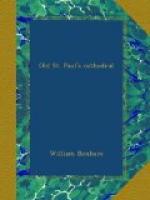Four years later came Wolsey, and sang High Mass to celebrate eternal peace between England, France, and Spain. The King’s beautiful sister, Mary, was betrothed at the same time to Louis XII., who was fifty-three years old, while she was sixteen. Within three months he died, and she married Charles Brandon, Duke of Suffolk, and became grandmother of Lady Jane Grey. Again one comes on a full description of the gorgeous ceremonial. A year later, the accession of Charles V. was announced by the Heralds in St. Paul’s, and Wolsey pronounced a benediction. The great Cardinal was now in full hopes of the papal tiara; the same year he came in state (May 12th, 1521) with the Archbishop of Canterbury, Warham, to hear Bishop Fisher denounce Luther at Paul’s Cross, with accompanying appropriate ceremonies. An account on a broad-sheet in the British Museum tells how Wolsey came with the most part of the bishops of the realm, “where he was received with procession and censed by Mr. Richard Pace, Dean of the said church.” Pace was a native of Winchester, who had won the favour of two successive bishops of that See, and been educated by them. One of them sent him to the Continent to complete his course. He took Orders in 1510, and his evident ability induced Wolsey to employ him in more than one delicate and difficult case of foreign diplomacy, and also brought him to the favourable notice of the King, who, after many other preferments, made him Dean of St. Paul’s on the death of Colet. He was held to be the very ablest of diplomatists, was a friend of Erasmus, and followed Colet in favouring “the new learning.” It was he and Sir T. More who persuaded the King to found Greek professorships at Oxford and Cambridge.
But to return to the ceremony at St. Paul’s. “After the Dean had duly censed him, the Cardinal, while four doctors bore a canopy of gold over him, went to the high altar, where he made his obligation; which done, he went, as before, to the Cross in the churchyard, where was a scaffold set up. On this he seated himself under his cloth of estate, his two crosses on each side of him; on his right hand, sitting on the place where he set his feet, the Pope’s ambassador, and next him the Archbishop of Canterbury; on his left hand, the Emperor’s ambassador, and next him the Bishop of Durham (Rusthall); and all the other bishops, with other noble prelates, sat on two forms out right forth, and then the Bishop of Rochester made a sermon by the consenting of the whole clergy of England, by the commandment of the Pope, against one Martinus Eleutherus and all his works, because he erred sore, and spake against the Holy Faith; and denounced them accursed which kept any of his books; and there were many burned in the said churchyard of his said books during the sermon. Which ended, my Lord Cardinal went home to dinner with all the other prelates.”




